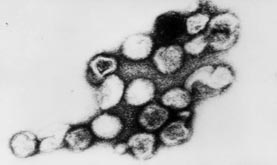 German measles (rubella) is an infection caused by a virus. Rubella infection in pregnant women is dangerous and can cause congenital rubella syndrome (CRS) in the baby.
German measles (rubella) is an infection caused by a virus. Rubella infection in pregnant women is dangerous and can cause congenital rubella syndrome (CRS) in the baby.
Rubella infection was once an important cause of congenital malformations and mental retardation in newborn babies and children in BC. The rubella vaccine has nearly eliminated rubella and CRS in British Columbia.
From 2002 to 2009 there were between zero to three rubella cases reported in BC annually. In 2010, BC experienced the largest outbreak of rubella in over a decade with nine confirmed cases in BC residents. All of the cases in the 2010 outbreak were associated with a single workplace and the index case’s infection was compatible with acquisition during travel to the Philippines.
There have not been any cases of congenital rubella syndrome in BC since a single case was reported in each of 2002 and 2004.
Measles-Mumps-Rubella vaccine 2-dose coverage at the second birthday has ranged from 74% to 76% in BC for the 2007 to 2010 birth cohorts.
For more information about cases of German Measles / Rubella in British Columbia see the most recent Annual Summary of Reportable Diseases.
Information for Health Professionals
Rubella is a relatively mild disease caused by the rubella virus.
- Low-grade fever
- Not feeling well, tiredness
- Raised, red, pinpoint rash that starts on the face and spreads downwards
- Rash lasts 3 – 5 days
- Half of all teenagers and adults with rubella develop muscle and joint pain
About half of all rubella infections show no symptoms of a rash.
Rubella spreads through close contact with an infected person and their nose and throat secretions, such as through coughing or sneezing.
Sharing food, drinks or cigarettes, or kissing someone who has the virus can also put you at risk.
Rare complications are encephalitis (an inflammation of the brain): 1 out of 5000 cases
Thrombocytopenia, an decrease in the number of blood platelets (the cells that help blood clot): 1 out of 3000 cases
Rubella infection during pregnancy can cause miscarriage, stillbirth and severe birth defects (deafness, eye problems, heart defects or liver, spleen and brain damage). This is called Congenital Rubella Syndrome (CRS) and occurs in 9 out of 10 babies born to women who have rubella infection in the first 3 months of pregnancy.
Rubella is diagnosed by the detection of rubella virus from an appropriate sample (nasopharyngeal or throat swab and/or urine) and a blood test.
Rest and treating the fever (if there is one). Most people do not feel that sick.
Immunization with MMR (measles, mumps, rubella) vaccine is the best way to prevent German measles (rubella).Wash hands well, especially after coughing and sneezing and before preparing foods or eating.Don’t share food, drinks, utensils, etc. 